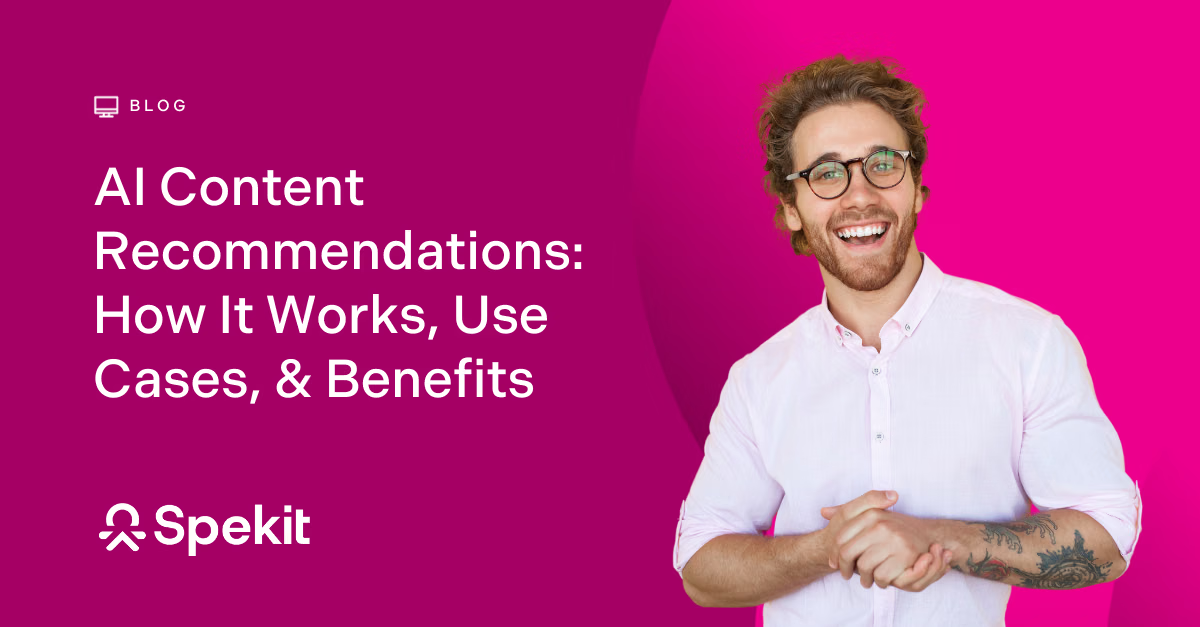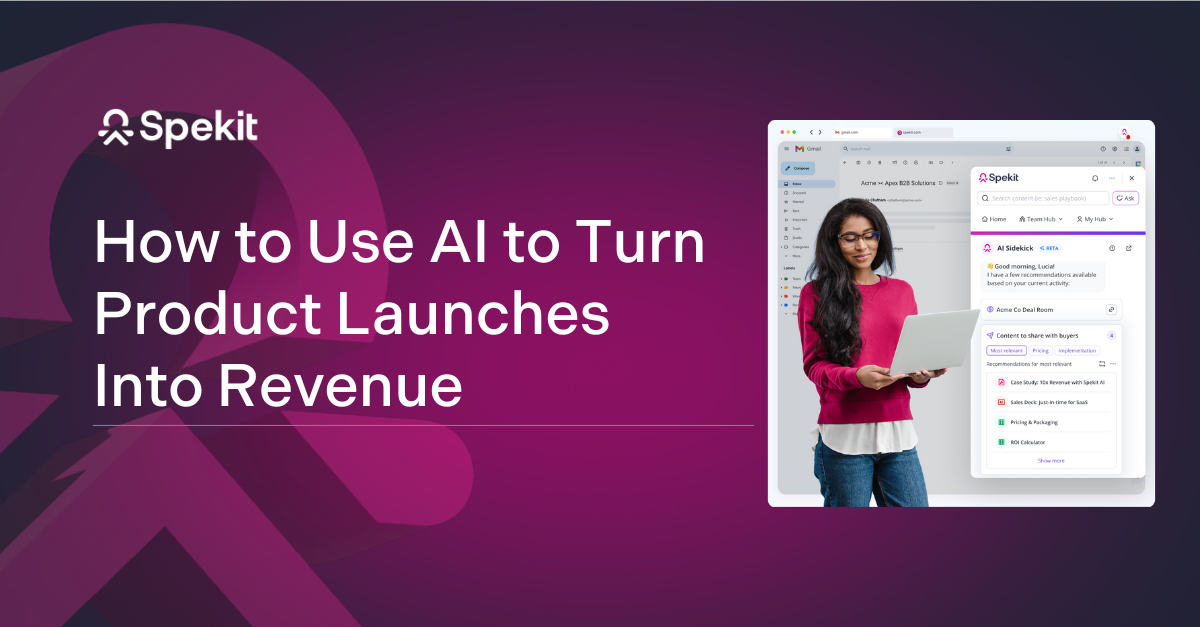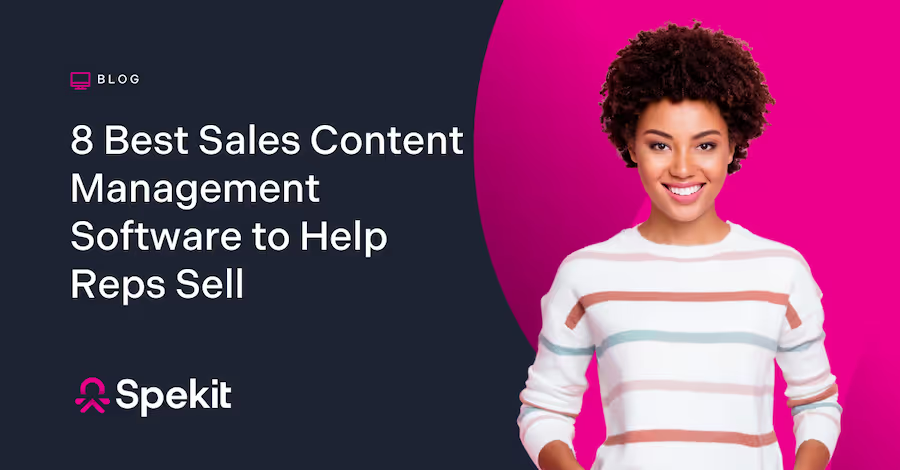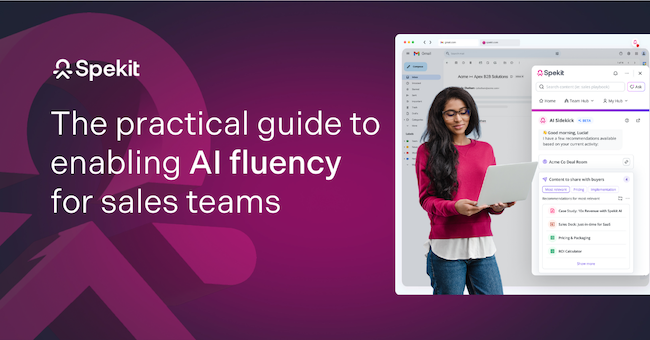When we think of generative AI in sales, we often discuss capabilities like AI content creation, summarization, and editing. But, once you've created all of that great content, how do you ensure your employees are actually using it. That's where AI Content Recommendations come into play.
What exactly are AI-powered content recommendations? And how do they work?
This article will review exactly how you can use AI content recommendations to drive sales and marketing productivity.
What are AI-powered content recommendations?
AI-powered content recommendations use machine learning to find and deliver content to you right exactly when and where you need it. They save you valuable time analyzing data, determining the type of content you need, and then finding and delivering that content.
Basically, AI-powered content recommendations know what you need before you do—and then hand it to you on a silver platter.

How do AI content recommendations work?
AI content recommendations collect and analyze data from sales interactions to suggest the right content, at the right time.
For example, say you’re a sales rep who’s just hopped off a productive call with a prospect and they’ve requested examples of work you’ve done with similar customers.
Here's the old way of finding sales content:
- Reviewing your call summary in Chorus after chatting with a hot prospect
- Realizing it’d be great to have a case study that speaks to the ROI of your product for that industry
- Leaving Chorus to dig through your CMS and Google Drive before eventually Slacking your marketing team to find it
Now, let's try the Spekit AI Content Recommendations way of finding sales content:
- Spekit AI analyzes the intent and context of your call summary and automatically serves you up that exact case study on a silver platter. No leaving, hunting, digging, Slacking required.
Makes for a more effective sales rep (and, much happier marketing teams).
You’ve likely interacted with many AI content recommendations before without realizing it. When you go on a streaming service, you’ll typically find a section labeled “For You” or something similar. This section takes in data on your previous watch history and recommends a show or movie you’re most likely to enjoy. Instead of having to search for a specific show or movie, the AI recommends it for you.

You’ve also likely interacted with AI content recommendations when looking to buy a new product. Perhaps you’re a regular shopper on a particular website. When you log into your account, you might be shown a list of products the website thinks you’d be interested in, with the suggestions being based on your purchase and search history.
Now, that same powerful engine has been applied to the workplace, transforming how sales reps access and engage with content.
Types of recommendation engines
As the name implies, all AI content recommendations utilize artificial intelligence, but not all AI-powered recommendations work the same. These AI recommendation engines are some of the most common ones you’ll come across.
Content-based systems: Content-based AI recommendation engines make recommendations based on the characteristics of a piece of content. It reads the attributes of products that a person has shown interest in before and categorizes content to make recommendations.
If someone were to use a streaming service and then frequently watch and highly rate sitcoms, the content-based AI recommendation engine would then recommend more sitcoms. This form of AI content recommendation focuses strongly on a user’s demonstrated preferences and interests.
Knowledge-based systems: Unlike content-based systems, which focus more on making inferences about someone’s preferences, a knowledge-based system relies on specific information to make a recommendation. Rather than making predictions, this AI recommendation engine matches users with stated information.
Imagine if someone were to use a home-buying application. They state that they want a house with three bedrooms in a particular location. That knowledge-based recommendation engine would deliver the user search results tailored to the type of home that they’re looking for.
Collaborative filtering systems: Collaborative filtering recommendation engines filter through items to recommend by relying on documentation of users’ past behavior. Using machine learning, these systems make recommendations based on the interests of people who have exhibited similar behavior. Rather than relying just on an individual’s data, it pulls in collective user data to use one person’s interests to make recommendations for someone else.
Say you’re on a website looking to buy a new pair of shoes. The collaborative filtering system’s algorithms will aim to show you shoes that it thinks you will like based on the buying history of like-minded customers.
Hybrid recommendation systems: As the name implies, a hybrid recommendation system is a mix of content-based, knowledge-based, and collaborative filtering systems, with the goal of using all the strengths of these AI content recommendation engines to make something even more accurate and tailored to each user.
Using parallel or sequential designs, several recommendation engines work at the same time to make one, more accurate recommendation, or recommendations from one engine go into another one to refine the result.
Benefits of AI-powered content recommendations
Let’s review the benefits of implementing AI content recommendations into your sales and marketing strategies.
Access to the right answers, content & training (faster!)
Sales representatives, on average, spend 440 hours per year trying to find the right content to send to prospects and customers. Considering that Salesforce found that sales reps spend less than 30% of their time actually selling, you need to find ways to give them back more time into their schedule.
Enter: AI-powered content recommendations. Whether your team is looking for answers to a training question or a piece of content to move a deal forward, these recommendations appear instantly–saving hours of time.
Enhanced adoption and engagement on content
An estimated 70% of marketing content goes unused. Marketing and enablement teams work hard to create the best case studies, whitepapers, and testimonials to educate and engage your prospects. But, actually finding that content all relies on sales reps actually knowing what to search for.
AI-powered content recommendations remove the guesswork. Instead of reps having to know exactly what piece of content to search for, Spekit AI
Implementing AI-powered content recommendations means you can create get more of the right content in front of your sales reps, at the right time. engagement from your prospects and current customers— higher customer acquisition and retention.
Increased conversion rates and faster pipeline generation on opportunities
Customizing your content to the unique needs, behaviors, and preferences of your prospect can mean more sales. In fact, McKinsey found that personalization drives between a 10% and 15% revenue lift for businesses.
Personalization can also shorten your sales cycle. According to research, some of the main factors that lengthen a sales cycle include failing to follow up efficiently, poor sales and marketing alignment, and a lack of tools and automation.
With Spekit AI giving you automated content recommendations based on your interactions with a prospect, you can follow up on your conversations confident that you’re giving them exactly what they need.

Limitations of AI content recommendations
One of the biggest challenges with using AI content recommendations is scalability, particularly if you have a limited content library that would be used to drive these recommendations. If you’re a new company just starting out, you might find that you don’t have enough content to surface based on each unique prospect interaction. You might also find that, with a limited content library, your recommendations become repetitive and can’t be as customized to individual needs as you’d like.
However, you’ll likely find that AI content recommendations become more beneficial when you’ve already spent some time developing your content library. Having an impactful resource for each persona, industry, or market that you serve will ensure you're getting the best results.
You should also ensure that you have a data governance policy to keep your data quality from deteriorating. Old, outdated, or incorrect data can result in less accurate AI content recommendations. Spekit AI helps to support this by populating data such as the number of views, number of shares, and last updated date to give reps confidence in the accuracy of the content they use.
Types of content recommendation systems using AI
AI content recommendations can be valuable for many different facets of your company, from sales and marketing to professional development through customization, personalization, and efficiency.
Let’s get into how you can use AI-generated content recommendations to give your whole business a boost.
Sales content recommendations
Your sales content matters more than you might realize. According to Prezentor, 95% of B2B buying decisions are directly influenced by content. But…65% of sales representatives say they can’t find the right content to send to their prospects.
One part of the problem is that, on average, sales teams have about 1,400 sales assets they interact with each year. With so many pieces of content available, it would be challenging to find what you’re looking for, even in the most organized sales content management system.
With all these pieces of content, a sales rep can’t know exactly what’s in every single asset. With Spekit’s AI-powered content recommendations, they don’t have to. Searching for a specific asset means the sales rep needs to know what they’re looking for in the first place. But Spekit AI knows what your sales rep needs before they do.
Spekit AI analyzes the context of each sales interaction and determines what your prospect needs to see next to close a deal and get that conversion. With an AI-powered enablement solution, sales reps can access the right content at the right time without the hassle of searching manually. Whether it’s a testimonial, a case study, an article, or any of your other hundreds of assets, Spekit AI knows just what your prospect really wants to see.

Marketing content recommendations
According to Forrester, about 65% of all content marketing assets go unused. The issue is: How can you use something that you don’t know is there?
Content marketing assets can be vital for both the sales and marketing teams, but silos can lead to a wealth of unused content. While marketing may be making these assets, sales may never put them to use because they don’t even know they’re there.
With Spekit's AI-powered content recommendations, you can bridge the gap between teams. This AI-driven approach powers our marketing collateral management software to ensure sales teams can easily discover and use the right marketing assets. Spekit AI can tell sales teams exactly which marketing content to send to prospects to move them further down the pipeline.
HR content recommendations
Employees may have questions about aspects of their job like their benefits and compensation, as well as overall company information, like the recruitment process and what roles they are currently hiring for.
Searching for answers to this information can be frustrating, and not just for the employee looking for answers. If your employees don’t have an easy way to access this information, they’ll bog the human resources department down with questions, and they simply don’t have the bandwidth to send content to employees all day long.
Instead, with AI-generated content recommendations, the answers to such questions will be surfaced directly to the employee, with no HR interaction necessary.
L&D content recommendations
Whether you’re looking to improve your customer service’s call center training, give your sales representatives a cold calling coach, or improve any other facet of your company’s training and onboarding, you can use learning and development (L&D) content recommendations.
With Spekit’s just-in-time training, answers come directly to the rep. No more having to search through endless manuals to find training content. Wherever they’re working, agents receive contextual bite-sized bits of learning. They can also take short quizzes to test their knowledge—and you’ll get insight into what topics your team needs to focus more on.
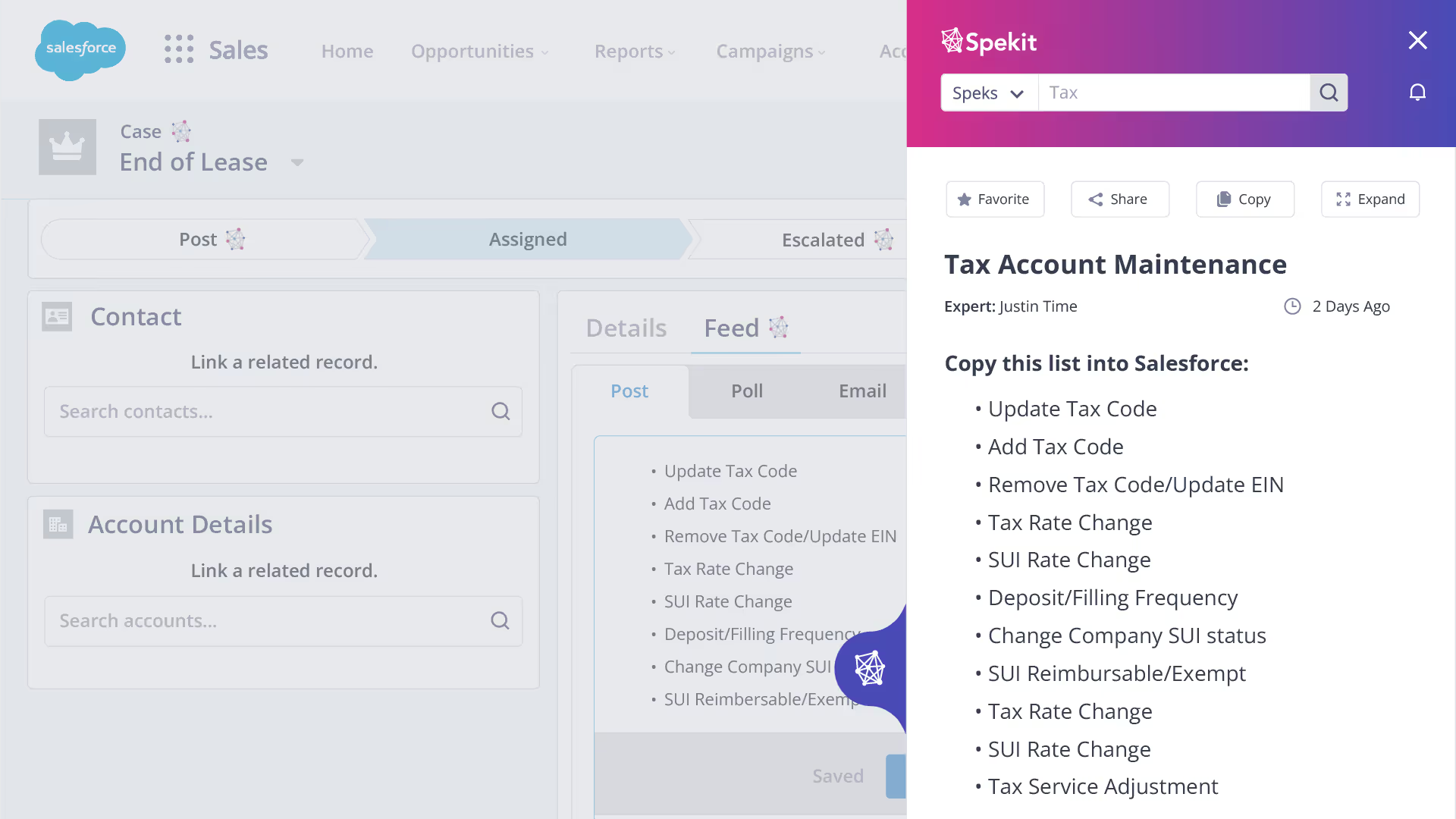
Enter the future of sales enablement with Spekit’s AI-powered sales content recommendations
Sale enablement means giving your teams the tools, knowledge, and skills they need to close more deals. With today’s need for more personalized interactions, you need an AI sales tool that delivers those crucial enablement resources right to your sales reps.
Spekit's AI-powered content recommendations automatically recommend contextually relevant, deal-accelerating content—right where they're selling.

